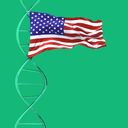Biotech is the new focus in U.S.-China tech rivalry

The need to quash outbreaks, quickly create medicines, stress-proof crops and fend off other 21st century threats is providing a lucrative arena for biotech companies to sell their services.
Why it matters: But the infrastructure to support such ambitions is increasingly recognized by the U.S., China and other countries as a linchpin of national security and economic strategy, putting it at the center of geopolitics.
- There is "tremendous competition for generating that ability and capturing that ability from the great powers," say Raj Panjabi, former National Security Council senior director for global health security and biodefense.
- The market for biologically engineered and produced materials, medicines, fuel and food could be worth between $4 trillion and nearly $30 trillion globally each year by 2030.
- Biology is the "last domain of engineerable science" and will be one of the greatest creators of economic value in the 21st century, says Matt McKnight, general manager of biosecurity at the synthetic biology company Ginkgo Bioworks.
Driving the news: Beijing's biotech ambitions are getting attention on Capitol Hill with new proposed legislation that could derail China's biggest biotech company's operations in the U.S.
- The House Select Committee on China last week introduced a bill to ban groups that receive federal funds from buying equipment and services from "foreign adversary biotech companies," Peter Sullivan and Adriel Bettelheim report for Axios Pro. Companion legislation is due to be marked up in the Senate Homeland Security and Governmental Affairs Committee.
- A target of the new bill is Chinese genomic sequencing behemoth BGI Group — which appears on the U.S. Department of Defense blacklist of Chinese military-linked companies that operate in the U.S. — and its affiliates.
- The bill points to BGI's global genomic data collection efforts, its obligation under Chinese law to transfer data to the country's government if requested and its alleged links to the Chinese military as national security threats.
- BGI Group told Axios in a statement that it doesn't have access to Americans' personal genomic data and denied allegations it helps the Chinese government collect DNA data through the China National GeneBank.
Between the lines: The new attention on biotech exposes a bigger concern about the global playing field.
- "All nations realize they need to invest in biosecurity and biotech, but most need to buy it from somewhere or partner with someone," McKnight says, adding their options boil down to Western or Chinese companies.
- BGI and its affiliates offer an array of integrated products and services, including DNA sequencing machines, mass spectrometry of proteins, diagnostic tests, reagents, and data storage and management.
- That kind of one-stop shopping isn't available from Western companies, leaving their customers to figure out how to integrate those systems by themselves. They also haven't been able to compete with BGI on costs.
"The U.S. doesn't have anything akin to BGI," says Anna Puglisi, a senior fellow at Georgetown's Center for Security and Emerging Technology (CSET), adding that China's industrial policies and subsidizing of companies "basically create an unequal playing field."
- What they're saying: BGI Group says it is privately owned and not controlled by the Chinese government, and the proposed legislation would "succeed only in driving BGI out of the U.S." and restricting competition in the market.
Details: BGI has nearly 400 subsidiaries and affiliates globally, with most of them in China, says Puglisi, who is the author of a forthcoming report about BGI.
- Looking at public filings and financial documents CSET researchers found "the majorities of stakeholders are government-related or government-associated, or funding comes from guidance funds," she says. "So this is really not like a private company."
How it works: Biocompetition falls into two buckets: the collection of data required to drive understanding of what genes do and all the potential power that comes from that in the form of medicines, crops and materials — and the supply chains to do it.
- Through the COVID pandemic, BGI has helped to set up genetic-testing sites in more than 20 countries, which have raised concerns about China's practices.
- Western companies, some of which are also working with countries to establish biosurveillance infrastructure, say they respect human rights and data privacy but struggle to compete on what they view as an unequal playing field.
- Ginkgo's "bioradar" to monitor pathogens is being used in about a dozen countries around the world. The company is now partnering with Illumina, which dominates the U.S. sequencing market, "on expanding biosecurity capabilities globally" by using Illumina products in network.
The big picture: Global economic and tech competition has evolved from being centered on engines, steel and other legacy technologies to 5G equipment, semiconductor chips and biotech.
- "The issue is the same" for these emerging and disruptive technologies, Puglisi says. "How do you deal with China's national champions that ... compete across a wide range of technology areas?"
What to watch: Countries are choosing whom they partner with in building their biotech and biosecurity infrastructure — BGI, Western companies or a combination of both.
- Serbia, which worked with BGI to establish a precision medicine institute, has since announced a planned partnership with Ginkgo.
- There are also questions about how aggressively the U.S. will respond — domestically and abroad. (Flashback: The U.S. State Department raised the alarm globally about 5G.)
- "The biotech space is heating up on the hill," says one congressional staffer. "There is so much room to shake it up."
- Moving too fast to lock out Chinese biotech tools risks disrupting U.S. research efforts and bioproduction because BGI and its affiliates are so deeply embedded in NIH-funded clinical trials and approved therapies, TD Cowen analysts wrote in a research note this week.
The bottom line: "The way in which computer science transformed the 20th century, biosciences will transform the 21st," Panjabi says. "This is biology’s century."